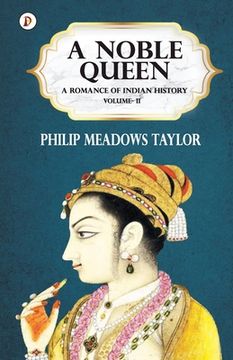Reseña del libro "A Noble Queen a Romance of Indian History Vol II (en Inglés)"
A Noble Queen: A Romance of Indian History by Philip Meadows Taylor is a novel written in three volumes that depicts one of the most important epochs in the history of the Deccan. The book features the life of the noble queen Chand Bibi who is remembered not only as the preserver of Bijapur, but for the heroic opposition she maintained against the Mughal armies in their first invasion of the Deccan and siege of Ahmednagar. Following an alliance policy, Chand Bibi was married to Ali Adil Shah I of the Bijapur Sultanate, who favored Shi'as. After his death in 1580, the Shi'a nobles proclaimed his nine-year-old nephew Ibrahim Adil Shah II as the ruler. A Deccani general called Kamal Khan seized power and became the regent. Kamal Khan was disrespectful towards Chand Bibi, who felt that he had ambitions to usurp the throne. Chand Bibi plotted an attack against Kamal Khan. Kamal Khan was captured while fleeing and was beheaded in the fort. Kishvar Khan became the second regent of Ibrahim. In a battle against the Ahmednagar Sultanate at Dharaseo, the Bijapur army led by him captured all the artillery and elephants of the enemy army. After the victory, Kishvar Khan ordered other Bijapuri generals to surrender all the captured elephants to him. The elephants were highly valued, and the other generals took great offense. Along with Chand Bibi, they hatched a plan to eliminate Kishvar Khan. Chand Bibi challenged Kishvar Khan, but he got her imprisoned and tried to declare himself the king. However, Kishvar Khan became very unpopular among the rest of the generals. He was forced to flee when a joint army led by a Habshi general called Ikhlas Khan marched to Bijapur. Following this, Chand Bibi acted as the regent for a short time. Ikhlas Khan then became the regent and was soon challenged by the other Habshi generals. Taking advantage of the situation in Bijapur, Ahmednagar's Nizam Shahi sultan planned to attack Bijapur. The troops available at Bijapur were not sufficient to repulse this attack. The Habshi generals realized that they could not defend the city alone, and tended their resignation to Chand Bibi. When order was restored in Bijapur kingdom, Chand Bibi returned to Ahmednagar. In 1591, the Mughal emperor Akbar asked all the four Deccan sultanates to acknowledge his supremacy. All the sultanates evaded compliance, and Akbar's ambassadors returned in 1593. In 1595, Ibrahim Nizam Shah, the ruler of Ahmednagar Sultanate was killed in a fierce battle. After his death, some nobles felt that his infant son Bahadur Shah should be proclaimed the king under the regency of Chand Bibi (his father's aunt). However, the Deccani minister Miyan Manju proclaimed the twelve-year-old Ahmad Nizam Shah II as the ruler. The Habshi nobles of Ahmednagar, led by Ikhlas Khan, were against this plan. The rising dissent among the nobles prompted Miyan Manju to invite Akbar's son Murad Mirza to march his army to Ahmednagar. While Murad was on the way to Ahmednagar, many noblemen left Ikhlas Khan and joined Miyan Manju. Miyan Manju defeated Ikhlas Khan and other opponents. Now, he regretted having invited the Mughals, but it was too late. He requested Chand Bibi to accept the regency and marched out of Ahmednagar. Chand Bibi accepted the regency and proclaimed Bahadur Shah king of Ahmednagar.

